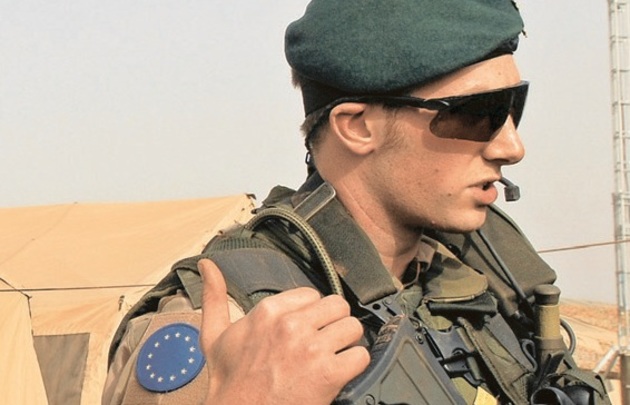Combat against a large, high-tech opponent like Russia, even in a limited conflict such as a Russian invasion of the Baltic States, would require divisions and brigades supported by all the specialized systems that a modern army needs: air cover, air transport, electronic warfare, reconnaissance systems, and more, The National Interest reports. Charles de Gaulle famously asked about France: "How can anyone govern a nation that has 246 different kinds of cheese?" He might well have asked how anyone can command an army made up 28 nations and 24 official languages.
French President Emmanuel Macron recently created a stir when he advocated the creation of a European army to defend Europe against Russia -- without having to rely on the United States. Though President Trump has questioned the need for NATO and accused the European allies of freeloading off American defenses, he responded to the idea of Europe defending itself by bringing up France's defeat in 1940.
France could just as easily bring up Pearl Harbor. But macho boasting of military prowess aside, there are good reasons to question the viability of a European army. "I would rather fight a coalition than be a part of one," said Napoleon Bonaparte, a man who knew how to lead French armies to victory against multiple coalitions over nearly two decades. Napoleon knew that an alliance is only as strong as its weakest link.
And a pan-European army would have numerous weak links, of which the political would be the biggest. Unlike its main enemy (Russia) or its muscular big brother (the U.S.), Europe is not a unitary actor. The European Union is more of an economic bloc than a true United States of Europe, and the Brexit of Britain and the growing populist movements in Italy and other nations don't bode well for continental integration. British officials have already rejected the idea of an EU army as undermining and duplicating NATO.
So, who would make the decision to commit a European army to war? If it’s the European Union, would it have to be a unanimous decision by all EU nations, as it is now to admit a new country to the bloc? Norway and Greece might have different ideas of what’s an issue worth fighting for. If it’s a non-political body like the EU civil service, then there will be complaints that unelected bureaucrats are making decisions about war and peace. If a European army ends up being mainly France and Germany, then how European is it?
War -- or at least war waged efficiently -- is not a consultative process. The World War II alliance between America and Britain -- as close a military embrace as ever existed -- was still riven by major disagreements over strategy. One reason that NATO has lasted 70 years is because it never had to do very much other than deter the Soviets, conduct a few small operations in the Balkans and Mediterranean, and send a few troops to support the U.S. in Afghanistan. Imagine if the U.S. had tried to push NATO into intervening in the Vietnam War.
For reasons of pride and history alone, European nations might want to keep their national armies, which leaves fewer resources for a pan-European army. And speaking of resources, if only 4 out of 29 NATO members met the NATO threshold of spending at least 2 percent of their GDP on defense (the U.S. accounts for 70 percent of NATO spending), then why would a pan-European force be any better funded? Europe has enough problems sustaining the military it has, such as most of Germany’s advanced Typhoon fighters being unfit to fly.
Ironically, the military challenges of a European aren’t as thorny as the political. Much will depend on what a European force will be used for. Europe has made some efforts at military integration over the years. In 1989, a joint Franco-German brigade was created, composed of troops from both nations. In 2017, France pushed through a European Intervention Initiative to promote military cooperation.
However, it’s one thing to create a small force like the Franco-German brigade that could be used for small peacekeeping or humanitarian operations in the Balkans or North Africa, or maybe dispatching a couple of battalions to Eastern Europe as a diplomatic signal. But combat against a large, high-tech opponent like Russia, even in a limited conflict such as a Russian invasion of the Baltic States, would require divisions and brigades supported by all the specialized systems that a modern army needs: air cover, air transport, electronic warfare, reconnaissance systems, and more. Currently, many of those capabilities are provided by the United States: NATO’s 2011 military intervention in Libya was only made possible because the U.S. provided air tankers, smart bombs and reconnaissance planes.
In the end, the real problem is that Europe as an aggregate power is immense: the combined EU economy is the second-largest in the world. But without political integration, Europe can’t field military power equivalent to its economic power. Someday, a European army might be formed seamlessly like 246 cheeses melted into a fondue pot. But for now, Europe is just a smorgasbord of individual dishes.






